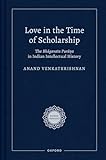Love in the time of scholarship : the Bhāgavata purāna in Indian intellectual history / [Anand Venkatkrishnan].
Series: Rocher indology seriesPublisher: New York, NY, United States of America : Oxford University Press, [2024]Description: pages cmContent type:- text
- unmediated
- volume
- 9780197776636
| Item type | Current library | Status | Barcode | |
|---|---|---|---|---|
 Open Access Books - Publishers
Open Access Books - Publishers
|
National Law School | Available | OABP709 |
Includes bibliographical references and index.
"We often talk about the life of the mind as if it were the mind that mattered, when it's really the life. This is a book about scholarly life. It is prompted by the question: What goes into a person's thinking? What draws someone to a concept, or a work of art, or a text? Where do they sit to write? What did they eat, smell, and see that day? Whom did they hear crying in the streets? These are questions about the everyday life of a scholar. In the context of this book, however, they are difficult questions to answer. For the study of intellectual life in premodern South Asia, particularly in the Sanskrit systems of knowledge, presents unique archival challenges. Even apart from the methodological difficulties, there are theoretical problems. Caught as we all are in the net of discourse and power, any appeal to inner life can only be romantic, nostalgic, or downright hagiographical. Still, I write this book from the premise that scholarly texts can tell us more about their authors than they, or we, let on. That means being open to the possibility that one can discern motivations, persuasions, irritations, hopes, and even fun, in a genre of writing that attempts to erase all traces of the quotidian. This book sniffs out those traces, like the scents of past lives which may yet permeate the present. In this book, I study the reception of a Hindu scripture, the Bhāgavata Purāṇa, from the fourteenth to the eighteenth centuries, in order to explore how religious commitments affect scholarly writing. I propose that we can delineate features of a scholarly habitus - personalities, dispositions, ethical comportments - in the writings of people who worked in a language, Sanskrit, and in a genre, scholastic prose or śāstra, that was notoriously abstracted from the world of everyday life. These members of an educated elite, contrary to how they often presented"-- Provided by publisher.
There are no comments on this title.
